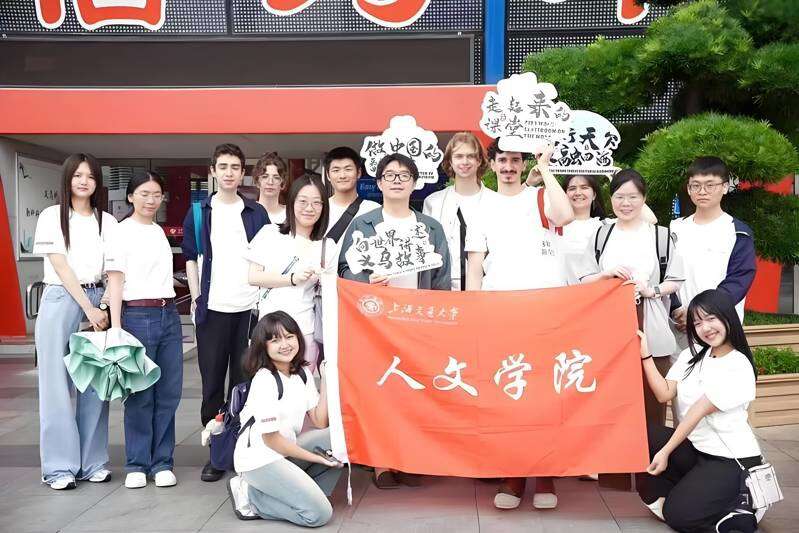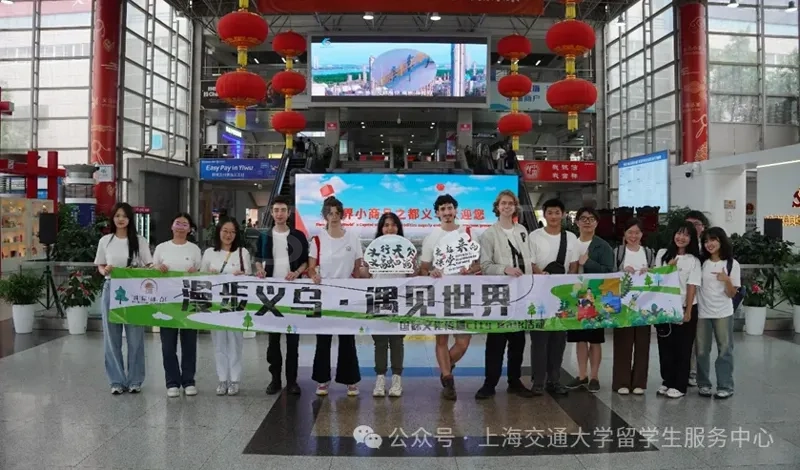When the wisdom of Jiaotong University meets the vitality of Yiwu: a cross-border cultural dialogue practice
Jul,08 2025
Amidst the stalls of the Yiwu International Trade City, a Turkish exchange student seamlessly switches between fluent Chinese and English, assisting a foreign buyer in precisely connecting with local merchants and facilitating their first cross-border procurement deal. At the cultural square of Jiming Mountain Community, the strains of the Cantonese song "Glorious Years," sung and played by a British student, linger in the air, while applause from young people of diverse nationalities intertwine with cheers from community residents. These are vivid scenes from a new chapter of Sino-foreign cultural exchange and mutual learning penned by the "Silk Road Cultural Transmission • Integration in Yiwu" team from the School of Humanities and International Students Service Center at Shanghai Jiao Tong University within Yiwu's international community.

From 23–25 June, 2025, this team, composed of teachers and students from China, Australia, Italy, Thailand, Turkey, and the UK, spent three days engaging in grassroots practice. They bridged hearts through language, forged consensus through culture, and wrote the next chapter of cultural exchange through actions.
As a critical node of the New Silk Road, Yiwu has attracted businesspeople from 219 countries and regions worldwide, providing a unique space for the dissemination of Chinese culture. "On the occasion of the twelfth anniversary of the Belt and Road Initiative, young students should focus more on enhancing their communication abilities and deepening intercultural exchange and mutual learning," noted by Xu Wen, the team's instructor. Focusing on the theme of "Traditional Culture," this practice translated the concept of "promoting the creative transformation and innovative development of China's outstanding traditional culture" into a five-dimensional, step-by-step process: "Adaptation - Experience - Integration - Participation - Dissemination." SJTU's Chinese and international students researched the Yiwu International Trade City to gain an in-depth understanding of cross-border trade under the Belt and Road framework; they attended community forums to learn about innovative grassroots governance models and actively offer suggestions for cultural governance and development; they participated in learning and performing traditional cultural arts; and they taught Chinese language courses from SJTU to the community's business migrants. This series of cultural activities provided SJTU students with first-hand experience of Yiwu's life and cultural landscape.

At the Yiwu International Trade City, students were deeply struck by the sheer scale—so vast that it would take three months to see every stall—and the rapid industry response, with popular products hitting the shelves in just 72 hours. This experience gave them a profound sense of the completeness and vibrant energy of manufacturing in China. Danny from Australia marveled, "I never imagined small commodities could be this spectacular." This immersive experience epitomized the project's fusion of national strategy with grassroots practice. The team set up a "live Chinese classroom" amidst the market stalls, conducting practical lessons through real-world scenarios like price inquiries and contract negotiations. Through language and culture, they built a communication bridge to help foster a world-class, market-oriented international business environment, promote the high-quality development of the Belt and Road initiative, and facilitate trade and investment liberalization.
At a Sino-foreign environmental protection seminar held in the community center, SJTU students and community workers discussed eco-friendly solutions, drawing on governance experiences from various countries. The team members proposed that for a highly international community like Yiwu, environmental governance must begin with the residents' mindset, subtly integrating green concepts into daily life. This approach perfectly aligns with the innovative spirit of the Jiming Mountain Community—nicknamed the "UN Community"—which champions a model of "leveraging international residents to manage international affairs." Beyond theoretical discussions, the team also gained hands-on experience in frontline community work. Italian student Davide and British student Noah participated in community night patrols and suggested adding multilingual safety signs. They learned that although a community may be small, its governance is challenging, with a complexity that far exceeds classroom understanding. Whether discussing environmental strategy or experiencing frontline duties, every interaction was a dynamic exchange between governance wisdom and youthful vitality.
This social practice offered a rich variety of learning experiences in traditional Chinese culture. Before a performance by the community's Yue Opera class, British student Noah warmed up the audience by singing the Cantonese version of "Glorious Years," while an Italian student donned a traditional costume to experience the flowing "water sleeves." In a calligraphy class, international students grasped the Eastern philosophy of "ultimate beauty and goodness" amidst the flowing ink. In the morning light of a community park, SJTU's Chinese and international students practiced Tai Chi with residents, the blend of firm and gentle movements mingling with greetings from the community's Arabic language class. The vision described by Fei Xiaotong—"Appreciate the beauty of other cultures as you do your own, and the world will become one"—has become a daily reality in Yiwu.
 :
: